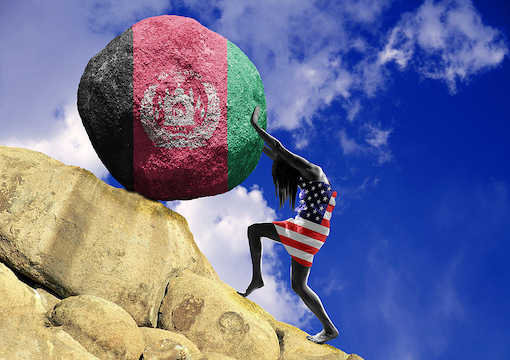
August 19, 2021

Source: Bigstock
In October 2001, a few hours after the American military landed in Afghanistan to avenge the terrorist attacks that had emanated from that country one month prior, a young British officer softly walked from his barstool in London’s Victory Services Club to approach an old gentleman sitting by a window. He was known as “the Brigadier” and had served in the Middle East during the Second World War. The young officer bent down and whispered, “The Americans have entered Afghanistan.” The Brigadier clenched his pipe between his teeth, let out a sigh, and said, “Bless their dear hearts, they have no idea what they’re getting into.” Truer words were never spoken.
Twenty years later that truth is known to all. Disparate world cultures are not an American strong suit; they are largely untaught in schools and aside from the odd genius on the game show Jeopardy! are not even mentioned. Separated by two vast oceans, generations of Americans grew up totally unconcerned by faraway places with strange-sounding names. But when you intend to travel to those faraway places you should at least attempt to study the cultures you will be encountering. Apparently, West Point, Quantico, and the Foreign Service no longer espouse this line of logic. And thus began America’s expedition North of the Hindu Kush.
The news media and the political class are currently consumed by the sense of shock at how rapidly the government we installed and the army we trained collapsed in the face of the enemy’s offensive. Yet that was only the result of two decades of errors that comprise the “root causes,” as they say. It’s the causes that are important so that we might, hopefully but doubtfully, learn from our mistakes.
The first error began shortly after the Taliban—the de facto government of Afghanistan, which had given refuge to Osama bin Laden, the mastermind of the September 11th terror attacks—were defeated on the battlefield. Afghanistan had been a monarchy from 1747 until 1974 when King Mohammed Zahir Shah was deposed by a cousin. A republic was formed. Few in Afghanistan knew what a republic was, and when they learned, they didn’t warm to the concept. Afghanistan is a tribal country formed by blood alliances, arranged marriages, personal oaths of fealty formed after perhaps decades of clan strife. When the Russians were defeated after their ill-advised attempt to install a communist regime, the Taliban emerged, and many Afghans thought the “Golden Era” of the monarchy would return. It was not to be; the Taliban instead offered a theocracy, on the Iranian model. When the Americans arrived, they made clear that monarchy was not an option. A republic with politicians posing as representatives of the people would be the model for national governance. Afghans don’t understand or trust strangers speaking for them in a legislative assembly. There are no family or clan connections involved and therefore no reason to think that concerns will be discussed. But Americans believe that their form of government is best and we have pursued that belief in every country that we have occupied and governed, irrespective of the fact that it may be contrary to local culture and customs. Thus the monarchy, the thread that had woven the social fabric for 300 years, was banished from consideration and we were immediately off to a very bad start.
The sheer size of the NATO response to 9/11 was also problematic. As the people of Afghanistan watched, every European flag appeared in their country. It seemed that all Christendom had descended upon them instructing them what to do and how to live. Afghans are a proud people, and with few exceptions they were not treated as equal partners in the anti-Taliban enterprise. This caused simmering resentment, which manifested itself in apathy or open opposition.
Military matters were paramount and other affairs were left in abeyance. Schools for girls opened, sporting events were held, and music could be heard in the streets, but the society’s deeper issues went unaddressed. For example, there was little interest in establishing a competent civil service.
The problem of systemic corruption was never rectified. Government ministers, contractors, and high-ranking military officers were very well paid and paid often, but the common soldier was not. Upon liberating a town or village from the Taliban, Afghan soldiers would demand payment from the residents for their liberation. To the local populations this was just the replacement of one band of brigands for another. Other soldiers, knowing their officers were stealing their pay, simply deserted.
Added to this was the almost constant change in allied commanders, and each commander had his own staff and his own military philosophy. The demands and personalities of various politicians didn’t help. When Gen. Stanley McChrystal was replaced because of his comments in a magazine article, the Taliban questioned the seriousness of American war leaders. In their view you do not remove a combat commander for a magazine interview.
The result of these and other failures was a Taliban army at the end of the conflict dealing with Afghan forces like a hot scimitar cutting through hummus.
And so it ends, at an airport surrounded on three sides by the enemy who also control the main access road. A more unfavorable military position is hard to conceive. When the infidels complete their evacuation, the true nature of the newly strengthened Taliban will become evident. The Americans will be gone, briefly mentioned over campfires like the soldiers of Sikandar (Alexander the Great), their souls consigned to the midnight skies.
An ancient people in an ancient land will return to their ancient ways. Informed that NATO can electronically monitor their military conduct in future years, Afghans answer with a shrug. Technological achievements are not impressive in every part of the world and hubris can be a fatal flaw.
When asked by Mussolini which gas was the most lethal, a scientist replied, “Incense, Duce.”